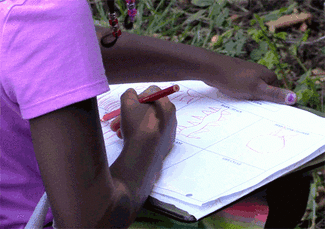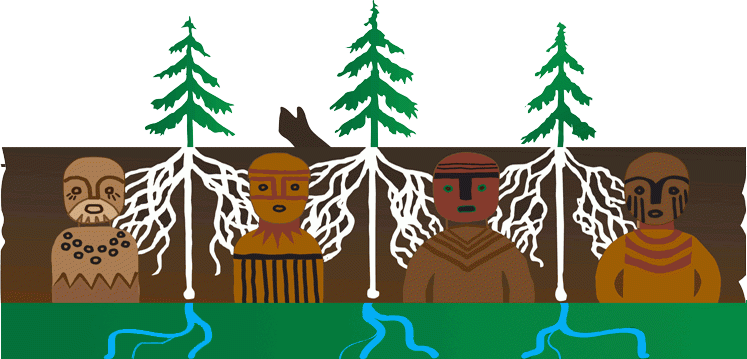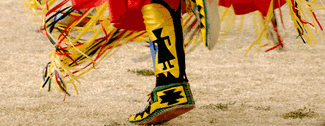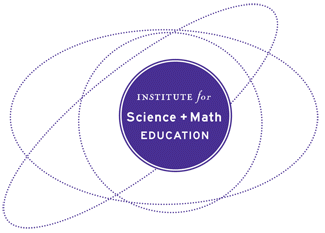Brief 5 - The Promise Of Indigenous Research
Written By Eve TuckWhat makes Indigenous research methods Indigenous? A partial answer is that Indigenous research methods have been made by Indigenous peoples for Indigenous communities. A more complete answer is that Indigenous research methods are Indigenous because of the theories and knowledge systems behind them.
Indigenous research methodologies emerge from Indigenous epistemologies, or knowledge frameworks, so they are always people and place specific (1-2). The same Indigenous research methods may be used across many contexts but will always need to be tailored to that context to match community needs and understandings of knowledge and knowing.
To do research in a way that reflects Indigenous beliefs about knowing, relationships, place, and time is to do research in a way that is inherently critical of how it is usually done in the academy and critical of the colonial enterprise of knowledge accumulation that defines academic research.
"Indigenous methodologies are tied to a larger project of Indigenous decolonization. They do not merely model Indigenous research, but “denaturalize power within settler societies and ground knowledge production in decolonization.”- Scott Morgensen3, (p.805)

Indigenous research methodologies and methods are discussed in plural form because they are numerous and diverse.
“Methods” refer to the activities of the inquiry project. It is important to remember that blood samples, bones, school records, and other documents ordinarily not considered to involve human subjects still once belonged to someone who was loved and important to others.
“Methodology” refers to the notions of knowing, being, and ethics that guide an inquiry project.
Relational Accountability
Critical to Indigenous methodologies is the concept of “relational accountability,” or what is most “important and meaningful is fulfilling a role and obligations in the research relationship—that is, being accountable to your relations” (4, p. 77). Creating and maintaining respectful and mutually beneficial relationships between researchers and Indigenous communities is of utmost importance, in part because Indigenous peoples have sometimes been mistreated and misled by academic researchers in the distant and recent past (1, 4, & 5).
Critical Questions: 4, (p. 77).
Aims Of Indigenous Research
Numerous Indigenous scholars have described the distinct aims of Indigenous and decolonizing research (1, 4, & 6-8). These aims are adapted from Eve Tuck (8):
1. Remember the true purpose of knowledge in & for communities
2. Uncover the quiet thoughts and beliefs of community
3. Map the variety of ideas in a community
4. Confirm that “indigenous traditions are the repository of vast experience and deep insight on achieving balance & harmony”
5. Make generational knowledge of elders, youth, parents, warriors, hunters, leaders, gardeners, fishers, teachers, and others available to other generations
6. Use Indigenous languages to express ideas, and to bring new language to new and recovered ideas
7. Honor all of our relations by engaging in the flow of knowledge in community
8. Reflect the cosmologies of our communities
9. Engage in place and land in ways that dramatically differ from more commonly held constructions of place and space.
Indigenous Theories
Indigenous research methodologies emerge from Indigenous epistemologies and theories. Important theories include refusal, non-abstraction of land, and Indigenous sovereignty.
Though it is clear that these theoretical concerns are central to Indigenous research methods, their connections to Indigenous research methods with youth are yet to be thoroughly defined.
Other theoretical concerns not described below also drive the proliferation of Indigenous research methods. Further, The roles of research in improving Indigenous life and relationships to land are often considered self-evident, but the role of research in our theories of change needs to be more fully evaluated and understood9.

References
1. Smith LT. Decolonizing methodologies: Research and indigenous peoples. London (UK): Zed Books; 2012.
2. Tuck E, McKenzie M. Place in research: Theory, methods, and methodology. New York: Routledge; 2014.
3. Morgensen SL. Destabilizing the Settler Academy: The Decolonial Effects of Indigenous Methodologies. Am. Q. 2012; 64(4): 805-808.
4 Wilson S. Research as ceremony: Indigenous research methods. Blackpoint (NS): Fernwood Publishing; 2008.
5. Tuck E, Guishard M. Scientifically based research and settler coloniality: An ethical framework of decolonial participatory action research. In Kress TM, Malott C, Porfilio B. editors. Challenging status quo retrenchment: New directions in critical qualitative research. Charlotte (NC): Information Age Publishing; 2013. p. 3-27.
6. Archibald J. Indigenous storywork: Educating the heart, mind, body, and spirit. Vancouver, (BC): UBC Press; 2008.
7. Kovach ME. Indigenous methodologies: Characteristics, conversations, and contexts. Toronto (ON): University of Toronto Press; 2009.
8. Tuck E. Rematriating curriculum studies. J Curr. Ped. 2011; 8(1): 34-37.
9. Tuck 2009
10. Simpson, A. (2007). On ethnographic refusal: Indigeneity, ‘voice,’ and colonial citizenship. Junctures. 2007; 9: 67-80.
11. Tuck E, Yang KW. R-words: Refusing research. In Paris D, Winn MT editors, Humanizing research: Decolonizing qualitative inquiry with youth and communities. Thousand Oakes, (CA): Sage Publications; 2014. p. 223-248.
12. Brooks L. The common pot: The recovery of native space in the northeast. Minneapolis (MN): University of Minnesota Press; 2008.
13. Goeman M. Mark my words: Native women mapping our nations. Minneapolis (MN): University of Minnesota Press; 2013.
14. Bang M, Curley L, Kessel A, Marin A, Suzukovich III ES, & Strack G. Muskrat theories, tobacco in the streets, and living Chicago as Indigenous land. Environ. Ed. Res. 2014: 1-19.
15. Cook-Lynn E. Who stole Native American Studies? Wicazo Sa Review. 1997; 12(1): 9-28.
Image page 1: Courtesy of EMMAS project: Native Science, Technology, Engineering, Art, and Math Summer Youth Program, 2014.
FOR MORE INFORMATION:
- IET Brief 1 Culture & Learning
- IET Brief 2 Indigenous Evaluation
- IET Brief 6 Indigenous Research with Youth
- University of Calgary: Indigenous Research
- Living in Relationships: Community-Based Research at the American Indian Center, Inc.
CONNECT WITH US ON SOCIAL MEDIA
- Facebook- Indigenous Education Tools
- Twitter- @indedtools; #indigenousevaluation; #nativeed; #ourstoryourplace
Indigenous Education Tools is a part of the Building Capacity And Cultivating Innovation project (BCCI). BCCI is designed to develop resources and practices that will have exponential impacts on efforts to improve Native student success across a variety of sectors.
Indigenous Education Tools / BCCI Project Contacts:
Megan Bang- mbang3@uw.edu
Charlene Nolan- nolanc3@uw.edu
Gabriel de Los Angeles- kender20@uw.edu




